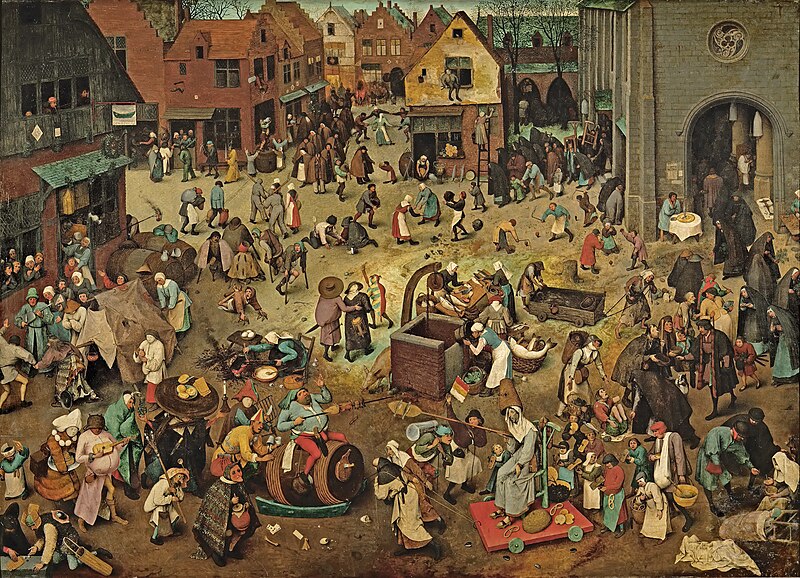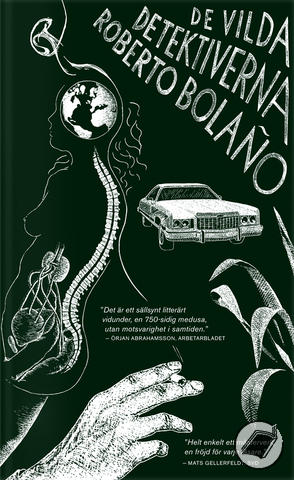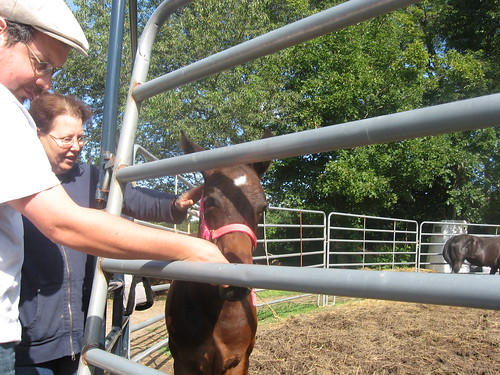|
|
Thursday, January 17th, 2008
This is the epigraph in front of Orhan Pamuk's The White Castle:
To imagine that a person who intrigues us has access to a way of life unknown and all the more attractive for its mystery, to believe that we will begin to live only through the love of that person -- what else is this but the birth of great passion?
Marcel Proust, from the mistranslation of Y.K. Karaosmanoğlu
This seems really intriguing to me: Pamuk is quoting a mistranslation into Turkish of a French text (and presumably a real, historical mistranslation), which has subsequently been (who knows, possibly mis-?)translated into English! (This book is translated by Victoria Holbrook, a new name to me -- it will be interesting to see how her rendering of Pamuk's work compares with that of Maureen Freely and of Erdağ Göknar.) I'm not familiar with Proust and have no way of knowing what the correct translation of the quoted bit is -- not really something I can look up via Google. I wonder...
posted afternoon of January 17th, 2008: 1 response
➳ More posts about Translation
|  |
Sunday, February 15th, 2009
From GarcÃa Lorca's "Ansia de Estatua",
Rumor.
Aunque no quede más que el rumor.
Aroma.
Aunque no quede más que el aroma. is translated (in New Directions' 1955 Selected Poems of Federico GarcÃa Lorca, various translators) as:Rumor.
Though nothing may remain but the rumor.
Odor.
Though nothing may remain but the odor. It seems strange to me not to use "aroma" to translate "aroma", keeping the look of the poem closer to the original. A possible objection is that "aroma" in English connotes a pleasant smell, I'm not sure it does in Spanish; but by the same token, "odor" connotes an unpleasant smell -- if I were looking for a neutral term I would use "scent". The rest of this sweet, sweet poem is below the fold.
 Pero arranca de mà el recuerdo
y el color de las viejas horas.*
Dolor.
Frente al mágico y vivo dolor.
Batalla.
En la auténtica y sucia batalla.
¡Pero quita la gente invisible
que rodea perenne mi casa! * I'm not sure why but these two lines make me think about Borges' The Circular Ruins every time I read them.
↻...done
posted morning of February 15th, 2009: 2 responses
➳ More posts about Writing Projects
|  |
Sunday, April 5th, 2009
So the first thing I am reading by Roberto Bolaño is the new book of poetry, The Romantic Dogs. The poems are delight, sparsely elegant, the author's voice clear and engaging. I find that I have not yet constructed an authorial persona to associate with this voice, so a lot of my reaction to the readings so far has been seeing who this voice reminds me of -- for instance there are some lines in the title poem that sound very distinctly like Robyn Hitchcock; "El Gusano" is reminiscent of Allen Ginsberg's poetry (as I said before); the structure of "La Francesa" (especially its ending) is most similar to Ferlinghetti. I expect I'll find plenty of other referents as I continue to read, eventually they should gel into a new author for me to carry in my head... Here is a passage that's puzzling me a little. See what you think. The poem "Resurección" begins and ends as follows: La poesÃa entra en el sueño
como un buzo en un lago.
...
La poesÃa entra en el sueño
como un buzo muerto
en el ojo de Dios. Healy translates this as:Poetry slips into dreams
like a diver in a lake.
...
Poetry slips into dreams
like a diver who's dead
in the eyes of God.
But this seems to me to miss the parallelism. "Dead in the eyes of God" is a lexical unit -- it is making the phrase "en el ojo de Dios" into a modifier for "muerto" -- but what I was thinking as I read the Spanish was, the "eye of God" was what the dead diver was entering into -- it was playing the same role that the "lake" was playing in the first sentence -- so I would have translated it more like Poetry slips into the dream
like a dead man diving
into the eye of God. (Also I would have said "into a lake" in the second line.) Is this a misreading?
posted afternoon of April 5th, 2009: 2 responses
➳ More posts about The Romantic Dogs
|  |
Thursday, November 25th, 2010
An example of the kind of sentence I was mentioning loving in Arte de la resurrección is near the beginning of Chapter 6, a description the people of Providencia (not, as I initially thought, a village in Elqui Valley, but a mining company town, a "salitrera," in the Atacama -- and referred to throughout the story as La Piojo, which I am understanding as Lousy*) gathering to await the Christ of Elqui. Listen:
The women came, their heads covered in dark bandannas, rosaries in their hands, a prayerful, focused halo softening the faces of these strong women, dutiful, capable of any sacrifice for their families. The children were running with their wire hoops, their tin wagons, with the rambunctious happiness of seeing something novel in the endless tedium which was the pampa, all the world they knew of; while those few men who were idling, who were spending the siesta on the hot stones by their front doors -- for most of them were together in the union hall, or keeping watch on the factory gate for strike-breakers -- came following the women and the children to see this novelty, ganchito, a Chilean Christ preaching in the desert. Even the most skeptical, the least credulous of them -- and the mine-workers were the most skeptical, the least credulous of anyone in the pampa -- those who could not believe that this layabout, this beggar could be Christ the King, that he was divine, could perform miracles -- "This Christ of the slums has never even healed a sleepy little girl, paisita" -- even these came to look away from his footprints with the disdainful grimace of the suspicious macho tattooed on their oblong faces.
At this hallucinatory siesta hour on the pampa, the sun was a burning stone at the center of heaven.
In the original the whole first paragraph is a single sentence, I could not avoid dividing it into a couple. You can spend a lot of time in front of that sentence as if it were a Bruegel, it repays multiple readings with new layers of imagery.

* Or also, I see piojo is slang in the Andes for "gambling den" -- so maybe the nickname means something like "Dive".
 I wonder a lot about how much weight I should give to cognates, to preferring English words which sound like the Spanish term they are translating, where it is feasible. This may end up statistically twisting the meaning of the text a bit as I read it. A similar caveat applies to the matter of using Spanish words in the translated text, this may need to change in a later draft... ("ganchito" in particular is a cheat; and I'm fairly sure the "look away from his footprints" passage is a mistranslation, that I don't understand the sentence as written.)
↻...done
posted evening of November 25th, 2010: Respond
➳ More posts about The Art of Resurrection
|  |
Sunday, November 28th, 2010
This is sort of an updated take on Borges' "Los teólogos" I think -- a man is reading and blogging about a book which he's reading in a language not his own (one not available in translation); he manages to create a controversy or at least a bit of publicity around blasphemy in the text which is, however, not actually present in the source material -- it is the product of a fundamental misreading on his part, but nevertheless the controversy necessarily involves the original author of the piece, a contemporary of the blogger's who is not seeking the spotlight. This publicity becomes the author's route to fame or celebrity -- a different fame than he would have had in mind, while the (mis-)translator is of course pretty much ignored in the press and ultimately forgotten by history.
posted afternoon of November 28th, 2010: 1 response
➳ More posts about The Theologians
|  |
Saturday, November 19th, 2011

De repente sentà que alguien me hablaba. DecÃan: señor Salvatierra, Amadeo, ¿se encuentra bien? Abrà los ojos y allà estaban los dos muchachos, uno de ellos con la botella de Sauza en la mano, y yo les dije que nada, muchachos, sólo me he traspuesto un poco...
— Amadeo Salvatierra
January, 1976
Amadeo Salvatierra's voice is one I could go on listening to for a long time without getting tired of it. His narratives seem to me to serve a special purpose in the vastness of part 2 of Savage Detectives, in that they keep the enclosing story of Belano et al. searching for Cesárea Tinajero front and center in the reader's mind. Below the fold, some lovely commentary from Salvatierra, in Natasha Wimmer's rendering, on the subject (near and dear to me) of mistranslation.
 Salvatierra is showing Belano and Lima his treasured copy of the old Visceral Realist journal Caborca.
...Cosmopolites that they were, the first thing they turned to were the translations, the poems by Tzara, Breton, and Soupault, in translations by Pablito Lezcano, Cesárea Tinajero, and yours truly, respectively. If I remember correctly, the poems were "The White Swamp," "The White Night," and "Dawn and the City," which Cesárea wanted to translate as "The White City," but I refused to let her. Why did I refuse? Well, because it was wrong, gentlemen. Dawn and the city is one thing and a white city is another, and that's where I put my foot down, no matter how fond I was of Cesárea back then. Not as fond as I should have been, I grant you, but truly fond of her all the same. Our French certainly left much to be desired, except maybe Pablito's. Believe it or not, I've lost my French completely, but we still translated, Cesárea in a slapdash way, if you don't mind my saying so, reinventing the poem however she happened to see fit, while I stuck slavishly to the ineffable spirit as well as the letter of the original. Naturally, we made mistakes, the poems wound up battered like piñatas, and on top of it all, believe me, we had ideas of our own, opinions of our own. For example, Soupault's poem and me. To put it simply: as far as I was concerned, Soupault was the greatest French poet of the century, the one who would go farthest, you understand, and now it's been years and years since I've heard a word about him, even though as far as I know he's still alive.
↻...done
posted morning of November 19th, 2011: Respond
➳ More posts about The Savage Detectives
|  |
Tuesday, June 12th, 2012
(Keywords pastiche, mistranslation?)
Si, en suma, fuese un acto carente de honestidad el simple gesto de coger un pincel o una pluma, si, una vez más en suma (la primera vez no llegó a serlo), tengo que negarme a mí mismo el derecho de comunicar o comunicarme, porque habiéndolo intentado fracasé y no habrá más oportunidades....No soy pintor.
What comes to mind as a means here of identifying with the narrator, or rather as a way of explaining the identification that is occurring, is to mistranslate his stream of consciousness, to replace the references to painting and to calligraphy with one's own arts and shortcomings; of course one would not be able to hew too closely to the original text for long/at all, and it might straightaway degenerate into pastiche and thence to original writing (a degeneration devoutly to be wished, one might assert) -- one might well veer off into pedagogy, might feel compelled to instruct one's (sparse, and ever dwindling!) audience in methods of blogging, on how to write without having to consider it writing, on how to take heart in one's feelings of inferiority to the successful bloggers and/or successful writers and journalists, to rejoice in one's own failure and lack of intellectual cred. Talk (to them, since you know who the couple of people are who read your journal, though perhaps without being up front about whom it is you're addressing) about composing posts with a particular ear in mind, and about how to avoid feeling slighted when you fail to engage, and here of course you will want to be careful about laying down a guilt trip, and will wonder if this bait will be sweet enough to pull anyone in. Push them away more likely! Hm: an idea worth pursuing perhaps.
posted evening of June 12th, 2012: Respond
➳ More posts about José Saramago
|  |
Wednesday, July 4th, 2012
Trying to flesh out the characters slightly... here are some different, fragmentary approaches, and a picture of my backyard that I'm happy with.   So you'll be talking about mistranslation and shortcuts, in the back yard with Laura, drinking in the humidity and the bird calls -- you'll be sprawled out on the grass beside where she's sitting, effectively you are looking up at the fading glow of sunset and she down at the book she's reading -- she's already getting annoyed at the dusk and swatting at a mosquito, heading in.
Peter's in the back yard lying sprawled out on the grass and Laura's sitting by his side and reading Josner's thoughts on magic -- sitting listening with half an ear to Peter's rambling discourse, now he's stuck on mistranslation
The book of poems is Josner's writings, short melodic notes on magic, not allowed to quote them but I should quote Peter's mistranslations, also show him writing in the back yard with his insect noise cicadas larks and bumblebee and walking in the early morning down past Mountain Station and the park, he's fretting, brooding as the nighttime's dark and quiet ebb, he heads back home and goes to brew some coffee.
↻...done
posted afternoon of July 4th, 2012: 1 response
➳ More posts about SOPOSP
|  |
Friday, May 24th, 2013
reconozca yo
en sueños
mi tiempo sea pasado
que los jotes que me mordisquean
el hidalgo
tengan últimamente razón
reconozco
en sueños
los nenes que me
habÃan llamado papá
érase una vez
en sueños
reconozco
por supuesto
no serÃa justo
reconozco
por supuesto
debo admitir, o más bién
me corresponde a mi decir
últimamente
afirmarme que
reconozco
en sueños
posted evening of May 24th, 2013: Respond
➳ More posts about Poetry
|  |
Sunday, November 27th, 2022
One of the first poems I ever translated was "Der Novembertag," by Rainer Maria Rilke. The closing line of the poem has the wind in the chimney sounding out "eines Totenkarmens Schlussoktaven." I mistranslated this as "a death-karma's closing octaves" which has always struck me as a beautiful and enigmatic image...
This morning it occurred to me to mention this in my recently-created Mastodon account; and Mastodon came through! A couple of people suggested the archaic German Totencarmen, meaning "funerary song," obviously the correct interpretation.
Der Novembertag
Kalter Herbst vermag den Tag zu knebeln,
seine tausend Jubelstimmen schweigen;
hoch vom Domturm wimmern gar so eigen
Sterbeglocken in Novembernebeln.
Auf den nassen Daechern liegt verschlafen
weisses Dunstlicht; und mit kalten Händen
greift der Sturm in des Kamines Wänden
eines Totenkarmens Schlußoktaven.
The November Day
Cold autumn can muzzle the day,
silence its thousand jubilating voices;
from the steeple whimper, so peculiar,
death bells in November's mist.
On the wet rooftops lies sleeping
a white fog; and with cold hands
the storm inside the chimney's walls strikes
a lamentation's closing octaves.
posted morning of November 27th, 2022: Respond
➳ More posts about Rainer Maria Rilke
| |
|
Drop me a line! or, sign my Guestbook.
•
Check out Ellen's writing at Patch.com.
| |















